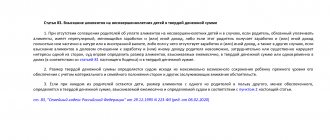Legislative standards
The procedure for calculating and paying alimony from wages is regulated by the Family Code of the Russian Federation, Federal Law No. 229-FZ of October 2, 2007 “On Enforcement Proceedings” and Government Decree No. 841 of July 18, 1996.
Part 1 of Article 81 of the RF IC specifies the amount of payments, but this legislative norm does not stipulate whether alimony is calculated from a “clean” or “dirty” salary.
From Article 81 of the RF IC it is clear that parents are obliged to support their minor children, and in the event of their divorce, the party ordered by the court pays alimony from their salary. For one child, 25% of income is charged, for two - a third. If a citizen has three or more children, then he will have to give half of his income as alimony.
Is alimony withheld from the advance payment and other nuances in enforcement proceedings?
An employer who is involved in enforcement proceedings related to the assignment of alimony must keep in mind that:
1. Deductions cannot be made, in particular:
- from daily allowances paid to the posted worker;
- from amounts to reimburse the employee’s business expenses;
- from child care benefits.
A complete list of income from which alimony cannot be withheld in court is given in Art. 101 of Law 229-FZ.
2. The question of whether alimony is withheld from the advance payment is within the full competence of the employer.
The main thing is that upon payment of the second (main) part of the salary, alimony is deducted in the established amount and subject to the restrictions determined by law. If alimony amounts to the maximum 70% of the salary, then when the salary is divided into 2 equal parts, one of them will go towards alimony in full, and another 20% will have to be taken from the other part of the salary.
2. Any alimony collected by the court must be the first in line among all payments by the employer - along with writs of execution to satisfy claims related to compensation for harm (clause 2 of Article 855 of the Civil Code of the Russian Federation). Only after making such payments are other deductions made from wages, for example, for unpaid advances.
3. If the alimony payer quits, then the company must report this (and the new place of work of the debtor, if it has such information) to the bailiff within 3 days after the occurrence of this event (clause 1 of Article 111 of the RF IC).
If this order is not followed, the bailiff has the right to apply sanctions to the company under Art. 17.14 of the Code of Administrative Offenses of the Russian Federation, or impose a fine under Art. 19.7 of the Code of Administrative Offenses of the Russian Federation in the amount of 300–500 rubles. (per official), 3000–5000 rubles. (for a legal entity).
The concept of “clean” and “dirty” wages
Before you find out the procedure for calculating enforcement payments, you need to understand the types of salaries. “Dirty” wages are the total income that the payer receives from one employer without taking into account taxes.
Everything that an employee receives monthly after deducting tax deductions through a cash register or on a bank card is called net wages.
Individual entrepreneurs also pay alimony from wages on a general basis, only the calculation base will be the amount of their income registered in tax returns. The procedure for confirming income for individual entrepreneurs is enshrined in the joint Order of the Ministry of Labor, the Ministry of Finance and the Ministry of Education of the Russian Federation No. 703n/112n/1294 dated November 29, 2013.
For those individual entrepreneurs who conduct their financial and economic activities on the PSN (patent), profitability will be determined in the income book for the patent system (Order of the Ministry of Finance No. 135n dated October 22, 2012).
Obviously, the salary before taxes is significantly higher than the final amount. That is why many people have questions regarding what kind of salary alimony is calculated from - “clean” or “dirty”?
The accountant is responsible for calculating all payments in accordance with current legislation. Next, we will look in detail at how exactly the amount of alimony is calculated.
How to apply the average salary in the country for arrears of alimony in 2020-2021?
It happens that before the alimony agreement was drawn up or the writ of execution was formed, the payer already had obligations to pay alimony (and they were not fulfilled). Alimony for the period between the moment such an obligation arises and the moment of its legal collection is subject to collection, but no more than 3 years before the possibility of its legal collection arises. And if the debtor evaded paying alimony intentionally, then for a period of any duration, starting from the moment the obligation to pay alimony arose.
The amount of payments for the period preceding the assignment of alimony is determined:
1. If the recipient of alimony is a minor child:
- based on the payer’s documented earnings;
- in the absence of such earnings - based on the average salary in Russia at the time of collection of alimony.
The average salary for calculating alimony in 2020-2021 and other periods is taken according to Rosstat.
2. In other cases - in accordance with a court decision or alimony agreement.
The payer and recipient of alimony in any case have the right to challenge the method of calculating it in court (Clause 5 of Article 113 of the RF IC).
Payment procedure
The procedure for calculating alimony from wages is approved at the legislative level. Part 1 of Article 99 of 229-FZ strictly states that all mandatory payments from the income of alimony payers are made only after all taxes have been withheld.
The conclusion is obvious. Calculated alimony cannot be withheld from dirty wages or from patent income in the case of individual entrepreneurship. All collections are made only from “net” wages or income after taxes are withheld.
“Dirty” wages do not reflect the real money that the payer may have, and therefore cannot be the basis for calculating alimony.
Moreover, many people mistakenly think that if transfers were made from “dirty” wages, then the amount that remains with the alimony payer after all deductions would be significantly greater. This is wrong. Let's present real numbers using an example.
In the first situation, we will consider how alimony is calculated from wages for “dirty” income; in the second, we will calculate payments from wages or patent income received by the alimony payer in hand.
- The citizen received “dirty” wages in the amount of 15,000 rubles. He has one minor child, to whom he must pay alimony in the amount of 25% of the monthly remuneration received or other income, including patent income. If enforcement payments are calculated from the “dirty” amount of income, then the child will receive 3,750 rubles, personal income tax will be calculated in the amount of 1,463 rubles, and the payer himself will receive 9,787 rubles.
- Let's calculate the amount of alimony not from the “dirty” salary, but from the amount of net income. The accountant initially charges personal income tax on 15,000 rubles, as required by law. The tax will be assessed and paid to the budget in the amount of 1950 rubles. A minor dependent will receive 3,262.50 rubles, and the citizen himself will receive 9,787.50 rubles.
Calculations clearly demonstrate that the amount of money that remains at the disposal of the alimony payer does not change depending on the procedure for calculating alimony from wages. When using a legally approved method, the amount of payments in favor of the child is insignificantly reduced, and personal income tax, on the contrary, increases.
How to find out your ex-husband's income to receive alimony?
How to find out the salary of your ex-spouse for the purpose of calculating alimony? Here you need to turn to legal practice, identify the methods that certain lawyers used to solve such problems.
Unfortunately, alimony from unofficial wages is not collected so often for the reason that the amount of income is extremely difficult to document.
Let's look at some options for how you can check your income and prove that you have it:
- You can have a conversation with the defaulter’s employer. Explain to him that the child needs money. Threaten to initiate tax audits. It is possible that this method of identifying income will work. The salary will become white. However, there are no guarantees. Employers also do not want to take on the additional financial burden associated with paying personal income tax, so, as a rule, they have no desire to legalize wages. This is a systemic problem that concerns not only issues of collecting alimony payments.
- You can try to collect alimony from unofficial income, confirming its existence with indirect evidence. For example, you can try to establish a logical connection with the debtor's level of expenses. Obviously, a person who does not receive money is not engaged in labor activity - he simply cannot make serious purchases. However, there are counterarguments to such arguments. The debtor can say that he has entered into a loan agreement and is making purchases with borrowed funds that are not income.
In general, the question of how to prove receipt of income and check its size remains open. In each specific case, it is advisable to contact a lawyer who will proceed from the actual circumstances of the situation.
Amount of alimony paid
After we have found out whether alimony is calculated from “clean” or “dirty” wages, we will figure out the minimum and maximum amounts of enforcement payments.
Article 81 of the RF IC stipulates that one dependent receives 25% of wages, two dependants receive 33% of labor income (from ordinary or patent activities), and three dependants receive 50% of remuneration for labor. In this case, the amount can be increased by court decision, but the total amount of alimony from wages should not exceed 70%.
If certain grounds arise, a citizen also has the right to go to court to reduce the amount of payments. If the payer has dependents from different marriages, then alimony from the salary will be transferred in equal shares for each minor child.
Flat amount of alimony
How else to collect alimony from black wages? If it is initially known that the potential payer of the funds receives a black salary and has no official income, then it makes sense to ask the court to collect alimony in a fixed amount of money, not tied to the level of income, proportional to the minimum subsistence level established in the country or region.
This method has its pros and cons. The main advantage is that the father will pay money regularly. Disadvantage: the court can determine the minimum amount of payments. For example, ½ the living wage. Formally, this is quite fair, because:
- the payer of the funds does not work;
- it is necessary that, in addition to the child, he can support himself;
- The responsibility to meet the needs of the minor lies with both parents.
To achieve an award of a significant amount of payments, the plaintiff in the case must:
- Prove that the financial needs of your son or daughter are quite great. It is very important to justify that when the parties to the case were married, some significant amount of money was spent on the child.
- Prove that the defendant, despite the fact that he does not have an official salary, has a means of subsistence. It may be possible to identify additional sources of funds.
What to do if a decision on alimony is made. Is it determined that funds should be collected as a share of income? It is possible to change the order of execution of a judicial act. But there must be reasons for this. For example, changing the position of the parties. Let's say the mother received a good salary and agreed that the father would not pay the money, and the child support arrears would accumulate. The situation has changed: the mother’s income has dropped sharply, and now the child needs to receive money from the father regularly. The court, having determined that the claim is justified, may change the collection procedure.
That's it for black wages. But there is such a thing as a gray salary, when part of the money, for example, some kind of salary, is paid officially, and the larger half of the salary is “in an envelope.”
Formation of the calculation base
Not all amounts accrued to the alimony payer are taken into account when calculating alimony from wages or other remuneration.
The following payments are deducted from the calculated amount of alimony:
- survivor's pension assigned by the state;
- compensation payments for damages and injuries received while performing main work;
- compensation for damage from man-made disasters;
- compensation for caring for a disabled dependent (parents, spouses);
- listed humanitarian aid;
- income received from business trips;
- depreciation proceeds.
In other cases, alimony from wages is collected in full. Salary or tariff rate, all bonuses and incentive payments, vacation pay, professional bonuses, additional payments for working overtime, at night and on holidays are taken into account when calculating “dirty” wages or remuneration for work before taxes. After all mandatory deductions, alimony is collected from the debtor in accordance with the established procedure.
Sources:
“Family Code of the Russian Federation” dated December 29, 1995 No. 223-FZ
Order of the Ministry of Labor of Russia No. 703n, Ministry of Finance of Russia No. 112n, Ministry of Education and Science of Russia No. 1294 dated November 29, 2013 “On approval of the clarification on the procedure for applying subparagraph “h” of paragraph 2 of the List of types of wages and other income from which alimony is withheld for minor children, approved Decree of the Government of the Russian Federation of July 18, 1996 N 841"
Order of the Ministry of Finance of Russia dated October 22, 2012 No. 135n “On approval of the forms of the Income and Expense Book of organizations and individual entrepreneurs using the simplified taxation system, the Income Book of individual entrepreneurs using the patent taxation system, and the Procedure for filling them out”
Federal Law “On Enforcement Proceedings” dated October 2, 2007 No. 229-FZ
How to get the child's father to pay more?
The alimony holder is not obliged to make payments in excess of the established amount. The amount can only be changed in court.
The reasons for changing the amount of payments may be:
- requiring urgent treatment as a result of deteriorating health conditions;
- the need for sanatorium-resort treatment;
- receipt of paid education by a child;
- registration of disability.
Each case must be considered separately.
Also, the amount of alimony can be increased in the event of a sharp change in the level of inflation, as a result of which the amount received will not be enough for the normal maintenance of minors.
To claim a larger amount, you must file a corresponding claim and provide a complete package of documents, which includes:
- evidence base showing the increase in child costs;
- a court decision on alimony or an agreement between spouses;
- receipt of payment of state duty;
- certificate of divorce and birth of a child;
- copy of the passport.
Briefly about black wages
Black wages mean the unofficial earnings of the payer. In 2021, this option is still common among Russian employers. In practice, the following options are encountered:
- Black salary. The employee is not officially registered. The employer does not make contributions to the Pension Fund or FSO for him. Personal income tax is not withheld from earnings.
- Gray salary. The employee is officially registered. But according to the contract, the amount of earnings is significantly less than the actual one.
The employer makes payments to the authorized bodies depending on official earnings. The remaining funds are transferred in the form of cash to the recipient directly (salary in an envelope).
Signs of receiving a salary in an envelope
If we miss the claimants’ argument “I feel in my heart that he is hiding his salary,” then we can identify the following signs of concealment of income by the payer, which are the most common in Russia:
- A sharp reduction in alimony down to “symbolic” amounts;
- The minimum wage payer visits other countries, buys real estate, large equipment, securities, or simply pays for repairs, expensive entertainment, etc.;
- The claimant “heard, saw, spied, and heard rumors” that the payer was indeed hiding wages;
- The payer, after alimony was assigned, sharply lost a large part of his official salary, while he is an excellent specialist and has a higher education (the same situation with individual entrepreneurs);
- The payer holds a management position, works full time, or is financially responsible for the company’s money, working for the minimum wage, which is a priori unacceptable.









